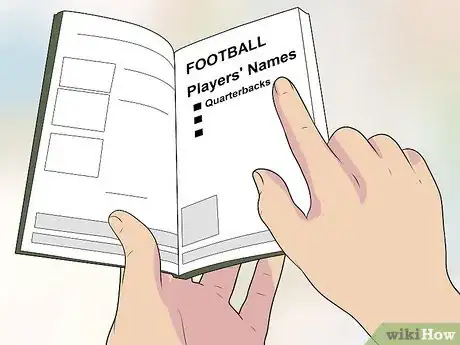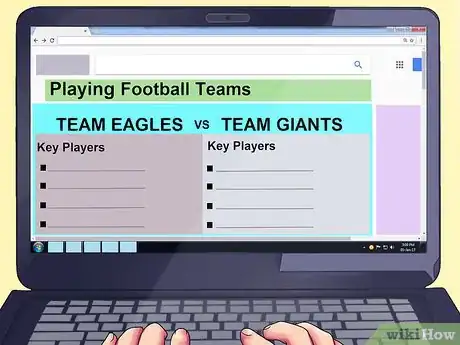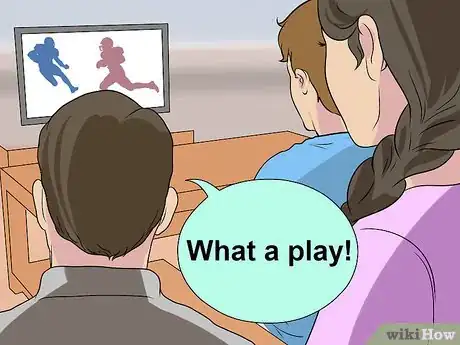This article was co-authored by wikiHow Staff. Our trained team of editors and researchers validate articles for accuracy and comprehensiveness. wikiHow's Content Management Team carefully monitors the work from our editorial staff to ensure that each article is backed by trusted research and meets our high quality standards.
There are 8 references cited in this article, which can be found at the bottom of the page.
This article has been viewed 56,565 times.
Learn more...
If your friends or coworkers are gathering to watch a football game, you don’t want to be left out. Of course, you also don’t want to be the only person there who doesn’t know anything about football. Since you probably don’t have time to watch a bunch of games to learn the sport inside and out beforehand, you’ll probably need to fake it a bit. With a tiny bit of knowledge, you can pass yourself off as a knowledgeable football fan, at least for a few hours.
Steps
Getting Some Basic Information
-
1Learn the basic rules. It’s going to be very difficult to fake knowledge of the sport if you don’t have a basic understanding of how it works. Football is a complicated game, but a knowing a few simple rules will prevent you from having to ask what is going on.[1]
- When they have the ball, the offense will have 4 plays to go 10 yards. If they get the 10 yards, that is a first down, meaning they now get another 4 plays to go 10 more yards. A phrase like “3rd and 7” means it is 3rd down (the third play of a possible four) and the offense needs to go 7 yards for a first down.
- There are several types of scoring plays in football. The most common is a touchdown, when a player gets the ball into the end zone, which is worth 6 points. After getting a touchdown, the team that scored has the chance to kick an extra point (1 point) or run another play (2 points). Other scores include a field goal, kicking the ball through the goal posts (3 points), and a safety, where the defense tackles the offensive player in his own end zone (2 points to the defense).
- Football has a lot of penalties with complicated hand signals. Luckily, the referee will announce the penalty after he has called it. You can know a penalty has been called because the referee will throw a yellow flag onto the field during the play.
- Lots of the sport’s little rules change yearly, and even ardent fans can have a hard time keeping up. Chances are if there is a new rule, the commentators will explain it to the audience, possibly even several times, so keep listening to them.[2]
-
2Find out a few players’ names. If you want to look like you know what you are talking about during a football game, you should probably know a few of the people involved. Quarterbacks are usually the most popular and famous players involved, though knowing the names of coaches and a few other random players will make you seem more involved and knowledgable.[3]
- Look for reasons to know about a player beyond what they do on the field. Players are real people too, and may have diverse interests, backgrounds, and charity work that can be interesting facts to know. Additionally, some of them may also have negative parts, like run-ins with the law.[4]
Advertisement -
3Research the teams playing. Learn about the teams that are playing, so you can have something to talk about. You’ll probably want to know a few of the key players, what the teams’ records are, and if there is any particular history between the two teams, such as being rivals, or having met in a big game in the recent past.
- Team websites and blogs are good sources for this kind of information. Some casual skimming of a more generic site like Wikipedia is good for basic background, while other more open sites like a team blog or even threads on Reddit can give you some idea on what fans of the team are thinking about and what is important to them.[5]
-
4Find some trivia to discuss. These can be obscure facts about the game, or maybe a crazy story involving one or more of the players. You don’t necessarily need to tell these stories, but they can be good things to know in the back of your mind. After all, you wouldn’t have that kind of information if you weren’t really knowledgeable about the sport, right?[6]
- There are plenty of good sources out there for information about sports and the athletes that play them. You can visit team and league websites, read the Sports section of your local newspaper, or find team-centered blogs. You can also watch programming on sports-based TV networks like ESPN or Fox Sports. Remember that you don’t need to learn everything there is to know about the team or sport, just a few interesting facts to mention if you need to contribute something.
-
5Listen to the commentators. These people are paid to explain the game to the audience, so take advantage of that. You’ll be able to pick up a few more terms or nuances of the game, and be able to interject them into conversation later.[7]
Blending in While Watching the Game
-
1Make occasional comments. You won’t be able to convince people of your knowledge by staying totally silent and hoping no one notices. Throw in a few generic statements about the game as it goes along. This will let other people believe you are involved, and give the more knowledgeable folks around a chance to chime in with more detail.[8]
- It’s best to keep your comments as generic as possible. Something like “What a play” or “Great move” can contribute to the conversation without having to actually say anything specific.
- Occasionally questioning the referees’ ability to make a call correctly is also a good way to throw something into conversation. Chances are someone will be able to agree when you say things like “What are they doing?” or “Tough call there.”[9]
-
2Ask questions. These should be open-ended questions that allow other people to talk. When something happens in the game, ask someone “What do you think about that play?” This gives the other person an opening to share their opinion, and means you don’t need to talk. Plus, you might learn something from that person's thoughts.[10]
-
3Change the subject. If the conversation starts to move into areas you don’t feel comfortable with, find ways to change the subject, or at least get yourself out of it. Unless people are yelling and getting heated, the topic probably isn’t so important that you can’t steer the conversation to something you are more comfortable with, like another sport, or another topic altogether.[11]
- Jumping in by saying “You know, that reminds me of something else...” can be a good way to start shifting the conversation to something you are more comfortable with, while not revealing that you don’t know what is going on.
- Another way to create a distraction is to step out of the conversation. Get a snack or drink for yourself, or other people, as a way to excuse yourself and step away.
-
4Project confidence when you speak. Speak slowly and calmly, and avoid saying something until you’ve figured out what to say. Avoid filler words such as “um” or “like” when stating something, as these tend to suggest you are uncomfortable with your ideas.[12]
- Remember that other people don’t know that much either. People love sports for a variety of reasons, including the tribal affiliation of rooting for “your” team or the narratives that a great game can provide. Mostly, people appreciate having something to talk about with others, much like a good television show. They might be faking it just as much as you are, meaning your confidence can go a long way.[13]
-
5Watch other people’s reactions. Even if you don’t quite know what’s going on, other people who do will be able to give you some clues. If other people start screaming at the TV, adding your own “Come on” or “What was he thinking?” gets you in on the action.[14]
- Similarly, don’t be the one person who reacts to something. What looks like a great play to you may actually be pretty routine, so don’t expose your lack of knowledge by overreacting to it.
-
6Support the team other people are cheering for. If you are watching a game with a group, chances are some of the people there really care about the outcome. You don’t need to actually know more or care about the sport to join the crowd in cheering the team on. Other people are also less likely to challenge your fandom if you aren’t actively supporting their opponents.[15]
- You should be able to figure out who people are cheering for. Many will be wearing team gear and colors. Even those that aren’t will react when something happens.
- Look for the hometown team. If you live in an area with a team (college or professional), you will likely be surrounded by that team’s fans. If you are looking to blend into the crowd, the local team is the one most people will probably be supporting.
- Wearing the team’s colors is a good idea, as that can help you blend in. Plus, by knowing the team’s colors, you can avoid the awkwardness of accidentally wearing the colors of the opponent, which will definitely draw attention to you.
- Be careful about wearing clothing with logos, like a jersey, t-shirt, or hat. By wearing the team’s logo, you are branding yourself as one of its followers. People will expect that you know something about the team beyond its name and mascot. If you want to go that route, make sure you’ve done a little research on the team and some players beforehand, just in case something comes up while talking. You’ll want to be able to respond briefly before shifting the conversation.
-
7Agree with people who challenge you. If someone challenges you, you want to stress how much you agree with him. If you try to argue back, you may need to reference evidence that you don’t actually have. Instead, emphasize things that you do agree on, and try to avoid actually responding to his questions.[16]
- Saying something like, “Come on, we’re both here to watch the game” can diffuse the conversation, and lets other people around you think you are trying to rise above the argument. The one person may not be convinced, but others will probably agree that watching the game is the most important thing.
Community Q&A
-
QuestionWhy would someone want to fake knowledge about football?
 Community AnswerMaybe they just want to impress someone or at least seem like they aren't completely lost when watching a game.
Community AnswerMaybe they just want to impress someone or at least seem like they aren't completely lost when watching a game. -
QuestionHow do I impress a guy who thinks I know nothing about football?
 Community AnswerTry to learn about football and then talk to him about it. You can also explain to him that you only know a little bit about football and would like to know more. He may enjoy explaining the details of the game to you.
Community AnswerTry to learn about football and then talk to him about it. You can also explain to him that you only know a little bit about football and would like to know more. He may enjoy explaining the details of the game to you.
References
- ↑ http://www.eonline.com/news/693702/are-you-ready-for-some-football-if-not-we-can-help-you-fake-your-way-through-an-nfl-game
- ↑ http://lifehacker.com/how-to-fake-your-way-through-the-super-bowl-without-kno-1757237457
- ↑ http://lifehacker.com/5853250/how-to-sound-like-you-know-what-youre-talking-about-even-when-you-dont
- ↑ http://www.esquire.com/sports/a35581/fake-your-sports-knowledge/
- ↑ http://lifehacker.com/5853250/how-to-sound-like-you-know-what-youre-talking-about-even-when-you-dont
- ↑ http://www.esquire.com/sports/a35581/fake-your-sports-knowledge/
- ↑ http://lifehacker.com/how-to-fake-your-way-through-the-super-bowl-without-kno-1757237457
- ↑ http://www.esquire.com/sports/a35581/fake-your-sports-knowledge/
- ↑ http://www.huffingtonpost.com/2015/01/28/super-bowl-tips-_n_6564144.html
- ↑ http://www.productivity501.com/6-ways-to-appear-smarter/343/
- ↑ http://lifehacker.com/5853250/how-to-sound-like-you-know-what-youre-talking-about-even-when-you-dont
- ↑ http://lifehacker.com/5853250/how-to-sound-like-you-know-what-youre-talking-about-even-when-you-dont
- ↑ http://www.telegraph.co.uk/men/the-filter/10890458/World-Cup-should-you-fake-being-a-football-fan.html
- ↑ http://www.huffingtonpost.com/2015/01/28/super-bowl-tips-_n_6564144.html
- ↑ http://www.esquire.com/sports/a35581/fake-your-sports-knowledge/
- ↑ http://lifehacker.com/5853250/how-to-sound-like-you-know-what-youre-talking-about-even-when-you-dont







































































